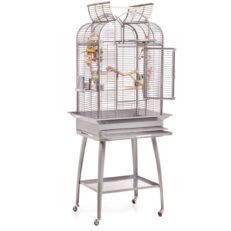
Parrots have long been recognized as intelligent pet birds due to their remarkable abilities and behaviors. Their talent for mimicking human speech and performing tricks has captivated the fascination of bird enthusiasts and researchers alike. But what exactly makes parrots smart? In this article, we will explore the intricacies of parrot intelligence and delve deeper into their remarkable abilities.
AVIAN INTELLIGENCE: UNRAVELING THE COMPLEXITY OF PARROT INTELLECT
Intelligence is a multifaceted concept that encompasses a wide range of cognitive and emotional abilities. When it comes to avian intelligence, parrots stand out as remarkable creatures with a wealth of cognitive prowess and intricate communication systems. In this article, we will delve deeper into the fascinating world of parrot intelligence, exploring their cognitive abilities, problem-solving skills, memory, and emotional intelligence.
Cognitive Abilities: Parrots exhibit a host of cognitive abilities that are truly awe-inspiring. These intelligent birds possess the capacity for problem-solving, abstract thinking, and reasoning. They can navigate complex tasks, manipulate objects, and exhibit flexible problem-solving strategies. Parrots have been observed using tools in the wild to accomplish specific goals, such as extracting food from hard-to-reach places. Their cognitive abilities rival those of some primates and demonstrate their adaptability and ingenuity.
Communication and Language: Parrots have a complex system of communication that goes beyond their remarkable vocal mimicry. While their ability to mimic human speech and various sounds is well-known, their communication repertoire extends to a wide range of visual cues, body language, and intricate vocalizations within their own species. Parrots use their communication skills to establish social bonds, convey information, and express their needs and emotions.
Problem-Solving Skills: Parrots possess excellent problem-solving skills and can demonstrate insight learning, a cognitive ability typically associated with higher-level intelligence. They can discern patterns, understand cause and effect relationships, and find innovative solutions to challenges they encounter. Parrots have been observed using their problem-solving abilities to access food, navigate complex environments, and interact with their surroundings.
Memory: Parrots exhibit impressive memory capabilities, both in the short-term and long-term. They can remember specific events, recognize familiar faces, and recall learned behaviors and vocalizations. This exceptional memory capacity enables them to establish strong bonds with their human companions and adapt to changing environments with ease.
Emotional Intelligence: Parrots possess emotional intelligence, which includes self-awareness, empathy, and an understanding of social dynamics. They can interpret and respond to human emotions, displaying empathy and providing comfort when needed. Parrots have the ability to develop deep emotional bonds with their human caregivers, exhibiting loyalty, affection, and a keen sensitivity to their owners’ feelings.
Learning and Adaptability: Parrots are renowned for their exceptional learning abilities. They can quickly acquire new skills, behaviors, and commands through positive reinforcement training. Their capacity for learning extends to a range of tasks, including performing tricks, solving puzzles, and engaging in interactive play. Parrots’ adaptability and eagerness to learn make them highly trainable and engaging companions.
Social Cognition: Parrots possess a remarkable understanding of social dynamics within their own species and with humans. They can recognize individual faces, interpret body language, and navigate complex social hierarchies. Parrots demonstrate a level of social cognition that enables them to form deep bonds, exhibit cooperative behaviors, and thrive in social environments.
PARROT COMMUNICATION: THE LANGUAGE OF FEATHERED TALKERS
Parrots are renowned for their exceptional communication skills, utilizing a diverse range of vocalizations and body language to express themselves. Their ability to mimic human speech and other sounds adds a captivating dimension to their communication repertoire. In this section, we will explore the fascinating world of parrot communication and delve into the various ways they convey their messages.
Vocalizations: Parrots are highly vocal creatures, using a wide array of vocalizations to communicate with their fellow parrots and human companions. Their vocal repertoire includes chirps, squawks, whistles, trills, and melodic tunes. Each vocalization serves a specific purpose and conveys different messages. For instance, alarm calls warn of potential threats, food calls indicate hunger or an offering, and contact calls are used to maintain social bonds and locate flock members.
Mimicry and Human Speech: One of the most intriguing aspects of parrot communication is their ability to mimic human speech and other sounds. This unique talent sets them apart from many other bird species. Parrots can imitate words, phrases, and even the intonations and accents of their human caregivers. This mimicry is not solely a result of auditory perception but also involves intricate vocal control and learning mechanisms. Parrots employ mimicry as a means of social bonding, attention-seeking, and self-expression.
Body Language: Parrots utilize body language as a powerful tool for communication. They express their emotions, intentions, and reactions through various physical cues. Puffed-up feathers can signify excitement, aggression, or an attempt to appear larger in the face of a perceived threat. Tilting their head can indicate curiosity or attentiveness. Wing flapping may express excitement or the desire to engage in play. These subtle and not-so-subtle body movements serve as visual signals in parrot communication.
Context and Social Interaction: Parrot communication is deeply intertwined with social interaction and context. They adjust their vocalizations and body language based on the specific situation and the individuals involved. Parrots are sensitive to the responses and behaviors of their human companions and fellow parrots, adapting their communication accordingly. Through this intricate interplay of context, vocalizations, and body language, parrots establish and maintain social bonds, express their needs and emotions, and engage in meaningful interactions.
Individual Variation: It is important to note that individual parrots can exhibit variations in their vocalizations and communication styles. Just like humans, each parrot has its unique personality, preferences, and vocal talents. Some parrots may be more inclined to mimic human speech, while others might excel in mimicking environmental sounds or displaying a wider vocal range. Understanding and appreciating these individual variations can foster a deeper connection and communication bond between parrots and their human caregivers.
PARROT MEMORY AND LEARNING: UNVEILING THE AVIAN MIND
Parrots are renowned for their exceptional memory and impressive learning capabilities. In this section, we will delve into the fascinating realm of parrot memory and learning, exploring their ability to retain information, recognize individuals, and acquire new skills through observation and imitation.
Memory Retention: Studies have revealed that parrots possess remarkable memory retention abilities. They can remember important information such as the location of food sources, nesting sites, and even the faces of individual humans and other birds. This long-term memory enables them to navigate their environment effectively and make informed decisions based on past experiences.
Learning through Observation: Parrots are astute learners and adept observers of their surroundings. They have been observed acquiring new skills by carefully watching and imitating the behaviors of conspecifics and even other species. This observational learning allows them to expand their repertoire of behaviors, adapt to new situations, and integrate novel problem-solving strategies into their repertoire.
Tool Use Learning: Parrots’ ability to learn tool use is a testament to their cognitive flexibility and adaptability. By observing other birds using tools, parrots can acquire the knowledge and skills required to use tools themselves. This remarkable learning ability highlights their capacity to grasp the underlying principles of tool manipulation and apply them in novel contexts.
Spatial Memory: Parrots demonstrate an exceptional ability to remember spatial information. They can recall the location of food sources, nesting sites, and even objects within their environment, even after extended periods without visiting or interacting with those locations. This spatial memory enables them to efficiently navigate their surroundings and locate vital resources.
Social Recognition: Parrots possess an impressive capacity for recognizing and remembering individual humans and other birds. They can distinguish between familiar and unfamiliar faces, forming strong bonds and attachments with their human companions. This social recognition showcases their ability to store and retrieve complex social information, contributing to their highly sociable nature.
Understanding the memory and learning abilities of parrots allows us to appreciate their cognitive richness and adapt our interactions and training methods accordingly. By providing opportunities for mental stimulation, engaging in positive reinforcement training, and offering varied and enriching experiences, we can support their cognitive development and foster a strong bond with these remarkable feathered companions.
In conclusion, parrots exhibit advanced memory and learning abilities, enabling them to retain and recall important information, learn through observation and imitation, and demonstrate exceptional spatial memory and social recognition. By recognizing and nurturing these cognitive capabilities, we can create an enriching environment that optimizes their mental well-being and encourages their continued cognitive growth.
THE BRILLIANT MINDS OF PET PARROTS: UNRAVELING INTELLIGENCE AMONG SPECIES
When it comes to pet parrots, intelligence is not a one-size-fits-all trait. Different species exhibit varying degrees of cognitive abilities. In this section, we explore some of the smartest pet parrot species, highlighting their unique intellectual capabilities and notable achievements.
African Grey Parrots: African Grey Parrots are widely recognized as one of the most intelligent pet parrot species. Their linguistic abilities are particularly astonishing, as they demonstrate an uncanny understanding of words and phrases. Studies have shown that African Grey Parrots can comprehend the meaning of words and even use them in appropriate contexts. They can mimic human speech with remarkable accuracy and convey specific messages through vocalizations. Their cognitive prowess rivals that of a human toddler.
Amazon Parrots: Amazon Parrots exhibit impressive problem-solving skills and cognitive flexibility. They have been observed using tools to obtain food, showcasing their ability to understand cause and effect relationships. Additionally, they possess advanced planning abilities, enabling them to strategize and anticipate future events. Their adeptness at problem-solving sets them apart as intelligent companions.
Cockatoos: Certain species of cockatoos, such as Goffin’s Cockatoos, have gained a reputation for their exceptional problem-solving abilities. These resourceful birds employ various strategies to obtain food, such as using their beaks to open shells, utilizing sticks as tools, and even manipulating food with their feet. Their ingenuity and adaptability demonstrate their high cognitive aptitude.
It is essential to note that intelligence can vary among individuals within a species, influenced by factors such as environment, socialization, and training. Each parrot possesses its own unique cognitive strengths and preferences, regardless of species. Providing a stimulating environment, interactive toys, and engaging training sessions can enhance cognitive abilities and promote mental well-being.
In conclusion, African Grey Parrots, Amazon Parrots, and certain species of cockatoos, such as Goffin’s Cockatoos, stand out as some of the smartest pet parrots. Their advanced linguistic skills, problem-solving abilities, and strategic thinking highlight the exceptional cognitive capabilities within the avian world. By recognizing and appreciating the diverse intelligence across species, we can better understand and cater to the unique needs of our feathered companions, fostering enriching and intellectually stimulating relationships.
CONCLUSION: UNLOCKING THE INTELLIGENCE OF OUR PARROT COMPANIONS
Parrots are extraordinary creatures with remarkable cognitive abilities that deserve our understanding and admiration. By delving into their intelligence, we can better cater to their needs and enhance their overall well-being.
Recognizing the intellectual capabilities of parrots allows us to provide them with the appropriate mental stimulation. By offering interactive toys, engaging in training sessions, and creating an enriched environment, we can unlock their potential and promote cognitive development. These activities not only satisfy their innate curiosity but also provide mental challenges that keep them engaged and fulfilled.
As parrot owners, it is crucial to observe and appreciate the unique intelligence displayed by our feathered friends. Each parrot has its own set of skills, whether it’s mimicking human speech, solving puzzles, or exhibiting problem-solving abilities. By actively observing their behavior and interactions, we can identify the specific cognitive strengths of our individual parrots.
In the comments section below, feel free to share your experiences with your parrot’s intelligence. What are the telltale signs of their cognitive abilities? Do they exhibit exceptional problem-solving skills, demonstrate linguistic talents, or surprise you with their ability to learn new tricks? Sharing your insights can inspire and enlighten fellow parrot enthusiasts, fostering a community that celebrates the brilliance of our avian companions.
Remember, by understanding and catering to the intelligence of our parrots, we can forge deeper connections and provide them with the fulfilling lives they deserve. Let’s continue to explore and unlock the endless potential of our feathered companions together!








